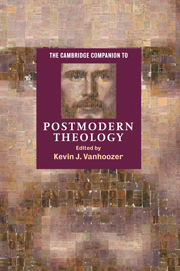Book contents
- Frontmatter
- Part 1 Types of postmodern theology
- 1 Theology and the condition of postmodernity
- 2 Anglo-American postmodernity
- 3 Postliberal theology
- 4 Postmetaphysical theology
- 5 Deconstructive theology
- 6 Reconstructive theology
- 7 Feminist theology
- 8 Radical orthodoxy
- Part 2 Christian doctrine in postmodern perspective
- Index
2 - Anglo-American postmodernity
a theology of communal practice
from Part 1 - Types of postmodern theology
Published online by Cambridge University Press: 28 May 2006
- Frontmatter
- Part 1 Types of postmodern theology
- 1 Theology and the condition of postmodernity
- 2 Anglo-American postmodernity
- 3 Postliberal theology
- 4 Postmetaphysical theology
- 5 Deconstructive theology
- 6 Reconstructive theology
- 7 Feminist theology
- 8 Radical orthodoxy
- Part 2 Christian doctrine in postmodern perspective
- Index
Summary
WHY WOULD ANYONE WANT TO THINK THAT?
We take Nicholas Lash, formerly Professor of Divinity at Cambridge University, as our first exemplar of postmodern theology in the Anglo-American tradition. Lash makes several claims that may strike the (modern) reader as strange. For one, he criticizes accounts of religious experience that assume such experience, at least in its richest and purest forms, to be experience of God. In contrast, he says, “on the account that I shall offer, our experience of God is by no means necessarily ‘religious’ in character nor, from the fact that a particular type of experience is appropriately characterized as ‘religious,’ may it be inferred that it is, in any special or privileged sense, experience of God.”
What is it, then, to know God? The word “God” is descriptive and not a proper name, and to believe in God is to believe that “there is something or other which has divine attributes.” The important question, then, is not whether God exists, but how to speak of God without becoming inane. All attempts to speak about God express the speakers’ deepest convictions about the character and outcome of that transformative (creative and redemptive) process in which they and others are engaged. The outcome of this process will define what it is to be human. Thus, Lash says, “human persons are not what we initially, privately, and ‘inwardly’ are, but what we may (perhaps) together hope and struggle to become.”
- Type
- Chapter
- Information
- The Cambridge Companion to Postmodern Theology , pp. 26 - 41Publisher: Cambridge University PressPrint publication year: 2003
- 2
- Cited by

